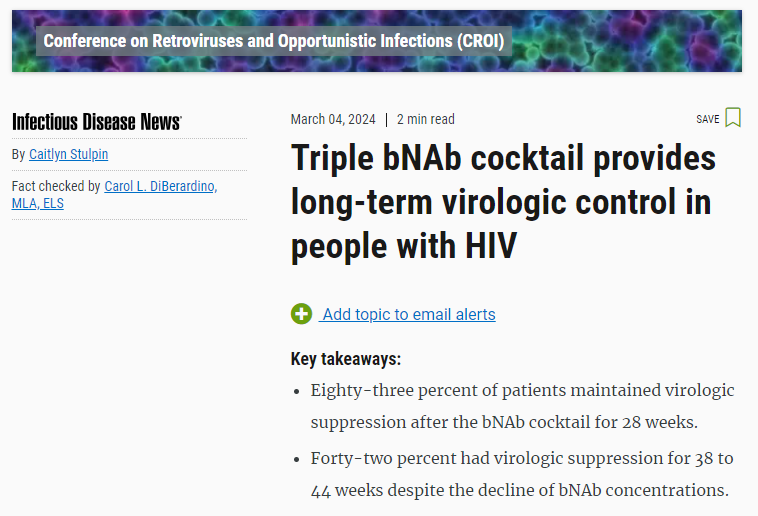Ruolo degli anticorpi monoclonali in una strategia di cura
Re: Ruolo degli anticorpi monoclonali in una strategia di cura
Ciao Dora, il micio sta bene (più o meno) anche senza le costose iniezioni mensili, i gatti sopportano il dolore molto più di noi umani, e cerco di accudirlo nel miglior modo possibile. Come hai scritto, la mania degli anticorpi è dilagata (forse questo mi ha reso riluttante) e non voglio spendere una fortuna, come nel caso di cure omeopatiche. Gli antidolorifici possono essere assunti solo per breve periodo, quindi, poverello, lo lascio così. (D'altronde anche io ho un mal di schiena cronico e non posso inghiottire brufen tutti i giorni). La frase "anticorpi monoclonali" l'ho appresa durante il periodo Covid e ora si legge dappertutto, da qui i miei dubbi. Ben vengano se hanno la capacità di neutralizzare il virus (da ciò che ho capito).
Re: Ruolo degli anticorpi monoclonali in una strategia di cura
Questo fact sheet appena pubblicato da TAG è uno strumento molto utile per sintetizzare le ricerche sugli anticorpi ad amplissimo spettro per una cura dell'infezione da HIV:
Broadly Neutralizing Antibodies (bNAbs) and HIV Cure-Related Research
Broadly Neutralizing Antibodies (bNAbs) and HIV Cure-Related Research
Re: Ruolo degli anticorpi monoclonali in una strategia di cura
Dal CROI:


Triple bNAb cocktail provides long-term virologic control in people with HIV
DENVER — A cocktail composed of three broadly neutralizing monoclonal antibodies resulted in long-term virologic control in people with HIV after they discontinued ART, researchers found.
“Broadly neutralizing antibodies have been around for about a decade now and are being developed for prevention but also for therapy. These antibodies have the ability to recognize a large variety of HIV strains that have been identified in individuals with chronic infection,” Boris D. Juelg, MD, PhD, principal investigator at the Ragon Institute of Mass General, MIT, and Harvard. Infectious Diseases Division, said at a press conference held during the Conference on Retroviruses and Opportunistic Infections.
Data derived from Juelg BD, et al. Abstract 121. Presented at: Conference on Retroviruses and Opportunistic Infections; March 3-6, 2024; Denver.
“The issue is that there's viral escape and a selection of resistant viral variants, which is an obstacle for that therapy,” he said. “So the idea then was to have more antibodies and increase the breadth of neutralization potency, by using antibodies that target different aspects of the virus.”
For the study, Juelg and colleagues first evaluated the pharmacokinetics of the broadly neutralizing monoclonal antibodies (bNAbs) PGT121, which targets the V3 glyvan supersite; PGDM1400, which targets the V2 apex; and VRC07-523LS, which targets the CD4 binding site.
The researchers then assessed the therapeutic efficacy of up to six monthly infusions of this triple bNAb cocktail in 12 people with HIV who discontinued ART after the first infusion of the cocktail.
Overall, 83% of participants (n = 10) maintained virologic suppression for the duration of the antibody dosing period for at least 28 weeks, whereas 42% of participants (n = 5) demonstrated virologic suppression for the duration of follow-up for at least 38 to 44 weeks, despite the decline of serum bNAb concentrations to low or undetectable levels.
Additional data from the study showed early viral rebound in two patients, which correlated with baseline resistance to two of the bNAbs — PGT121 and PGDM1400 — whereas late viral rebound in five participants in the context of declining bNAb levels was characterized by sensitive and resistant rebound virus.
“Overall, this study showed that the three antibodies with a significant breadth of neutralization were actually able to maintain suppression at least during the dosing period in a large majority of the participants, and in a smaller subset, this control was maintained when the antibodies had reached very low levels up to week 44,” Juegl said. “Future studies have to show that is maintained for much longer and what the exact mechanisms of control are.”
“This is something that we're working on right now,” he said.
Source: Juelg BD, et al. Abstract 121. Presented at: Conference on Retroviruses and Opportunistic Infections; March 3-6, 2024; Denver.
Disclosures: The authors report no relevant financial disclosures.
